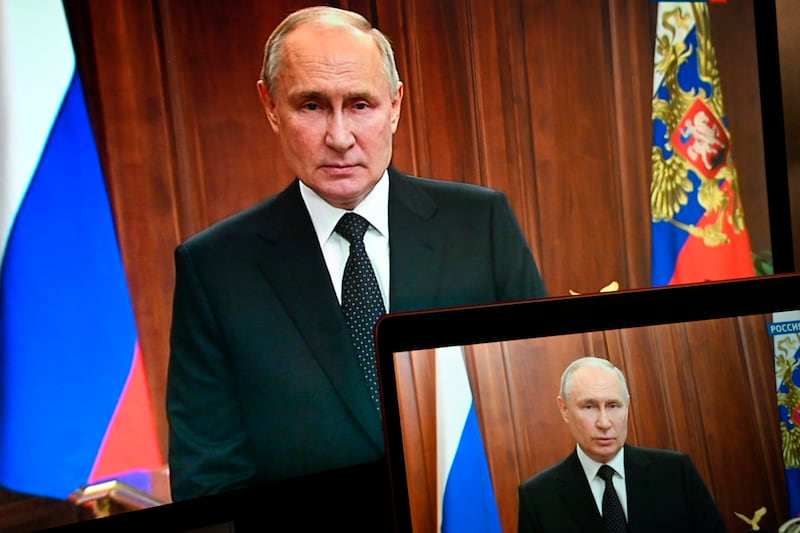The EU's foreign affairs chief Josep Borrell said on Monday that the war in Ukraine had weakened Russian power, as Moscow sought to restore calm after an aborted mutiny by Wagner mercenaries at the weekend.
Mr Borrell, who arrived at a meeting of the bloc's 27 foreign ministers in Luxembourg, seemed to compare the group to a “monster”.
“What happened this weekend showed that the war against Ukraine is cracking Russian power and affecting its political system,” he said, describing the recent events as an "aborted armed insurrection."
“It's not a good thing to see that a nuclear power like Russia can go into a phase of political instability.”
Mr Borrell said it was more important than ever that the EU continue to support Ukraine.
“The monster that [Russian President Vladimir] Putin created in Bakhmut [ …] is acting against its creator,” he added.
Bakhmut is a city in Ukraine's Donbas region that was captured by Wagner forces after a gruelling battle and handed over to Russian troops last month.
The mutiny, in which Wagner troops got within a few hundred kilometres of Moscow before turning back, has raised questions about its impact on the war in Ukraine, said Danish Foreign Minister Lars Lokke Rasmussen.
“It goes without saying that what is happening in Russia has a huge impact on the rest of the world, and could have an impact on the ongoing war as well. So that's something we are monitoring very closely,” he said.
“It’s my interpretation that Putin is weakened to some extent at least.”
As events unfolded in Russia on Saturday, Copenhagen hosted a meeting, organised by Ukraine, bringing together several nations to discuss a path towards peace.
Mr Lokke Rasmussen said he was pleased the meeting had gone ahead despite the escalation in Russia.
“The most important thing is the meeting itself and that's a positive signal,” he added.
'A Russian internal event'
Many European leaders have stressed that the aborted mutiny was an internal Russian affair and adopted a “wait and see approach”.
“I want to emphasise that this is an event that is a Russian internal event and we are solely observing what is happening,” said Finnish Foreign Minister Elina Valtonen.
“It’s still early to tell where this will lead to but of course it’s pretty obvious that the events of the weekend will have a continued effect on how Putin is seen internally but also on how Russia is seen to the outside,” she told reporters.
Her French counterpart, Catherine Colonna, said that “there were more questions than answers” about what exactly happened at the weekend.
“We have to remain cautious,” she said. “We have surely not seen all the consequences of these events unfold yet.”
The mutiny ended with a deal involving Wagner leader Yevgeny Prigozhin reportedly leaving to Belarus. His current location is not known.
EU members that border Belarus expressed fears about further destabilisation.
“It took half a day for a military detachment to move 200km away from Moscow. How fast can they do that crossing Belarus and appearing at the Lithuanian border?” asked Lithuania's Foreign Minister Gabrielius Landsbergis.
“We are very strongly asking allies to look at our situation extremely seriously in light of everything that is happening in Russia and put out very specific plans in how to reinforce the eastern flank.”
European foreign ministers approved a boost of €3.5 billion ($3.81 billion) to a military aid fund used to bankroll weapons and ammunition for Ukraine.
The ministers raised the financial ceiling to more than €12 billion ($13 billion) on the European Peace Facility – a fund that has already allocated about €5.6 billion ($6.1 billion) in military aid for Ukraine.
However, Hungary continues to block the allocation of another 500 million-euro ($545 million) tranche of the fund for Ukraine - a "deplorable" situation, according to Mr Borrell.
Budapest has said it will not lift its block until Kyiv removes Hungarian bank OTP from a list of companies it deems “international sponsors” of Russia's war in Ukraine.
The fund, established in 2021, was conceived for the EU to help developing countries buy military equipment. But the union quickly decided to use it also to get weapons to Ukraine after Russia's invasion in February last year.
European foreign ministers also adopted a ninth package of sanctions related to human rights violations in Iran linked to its crackdown against a protest movement.







